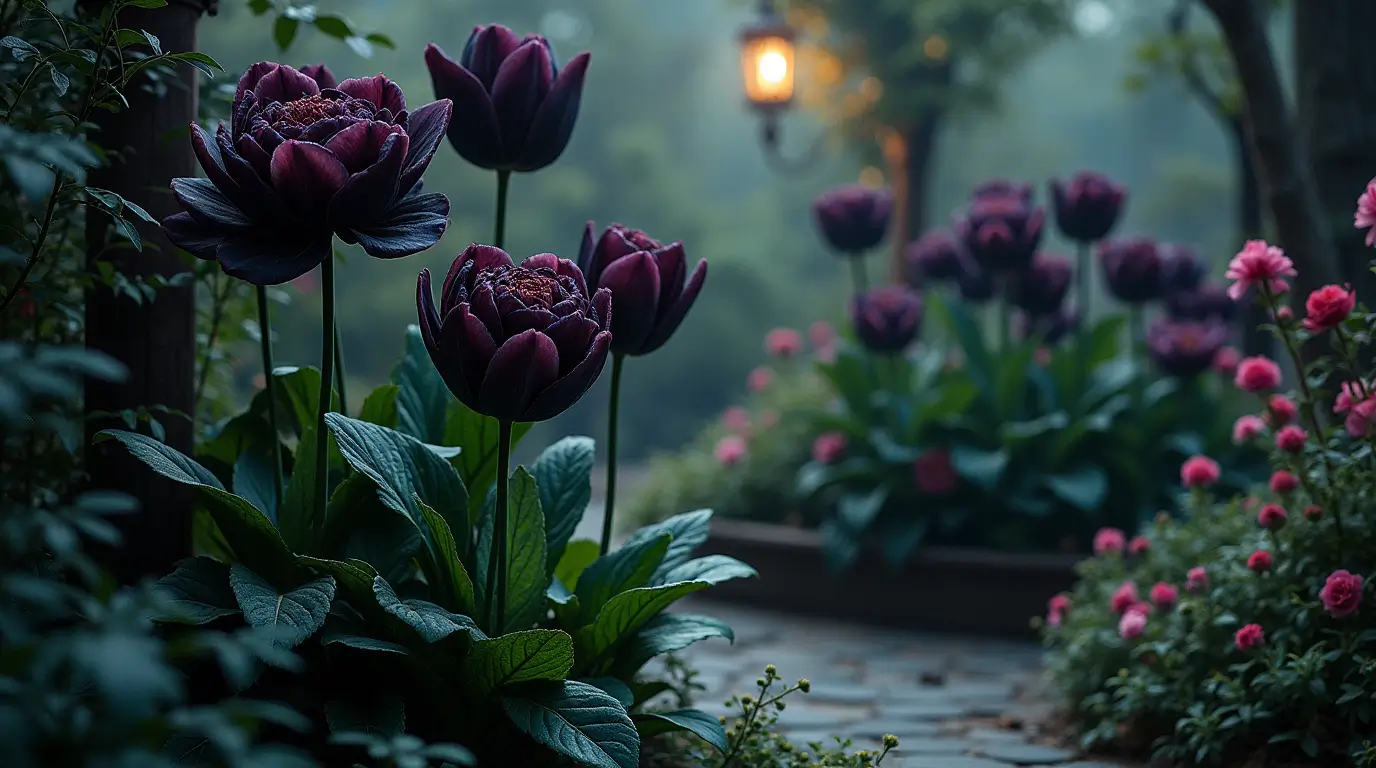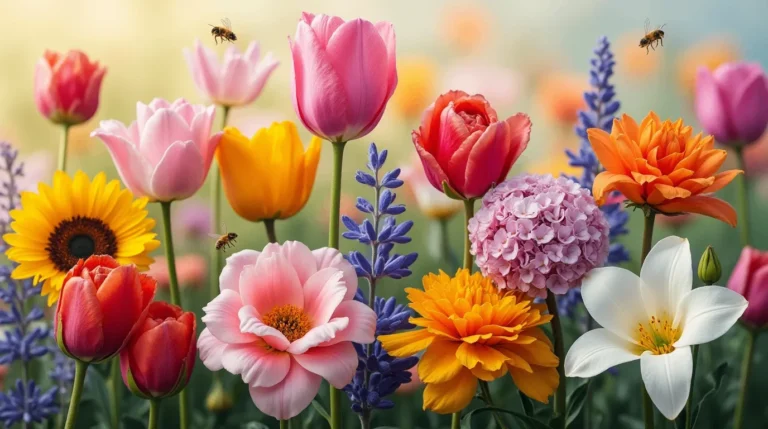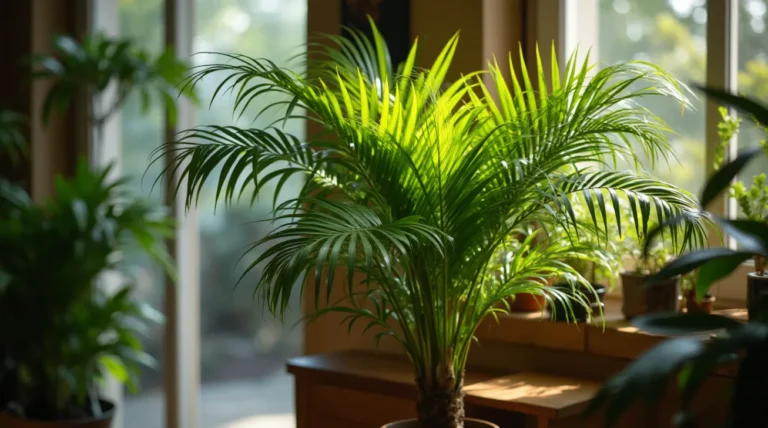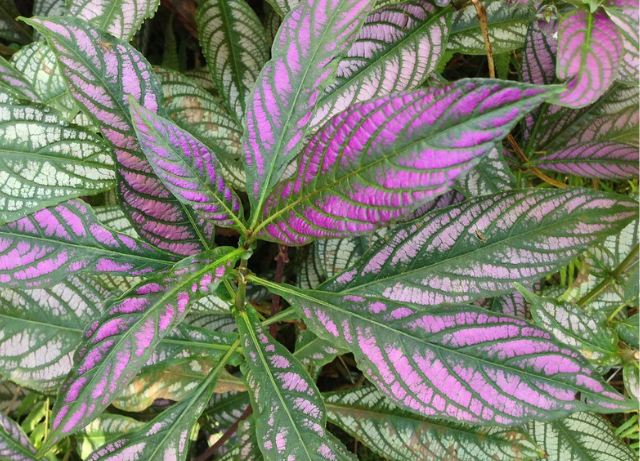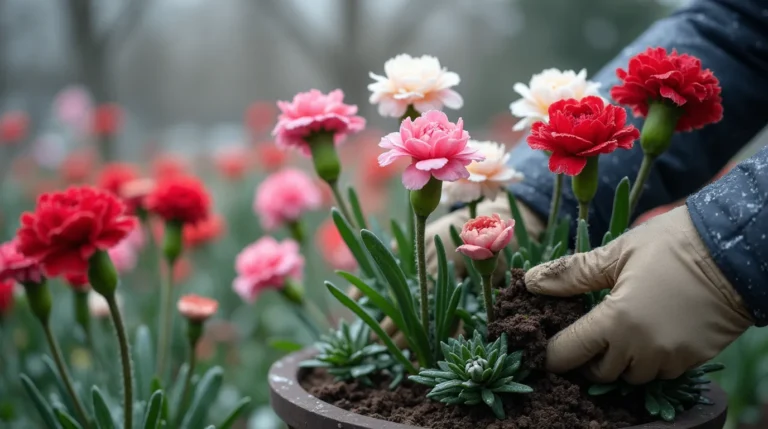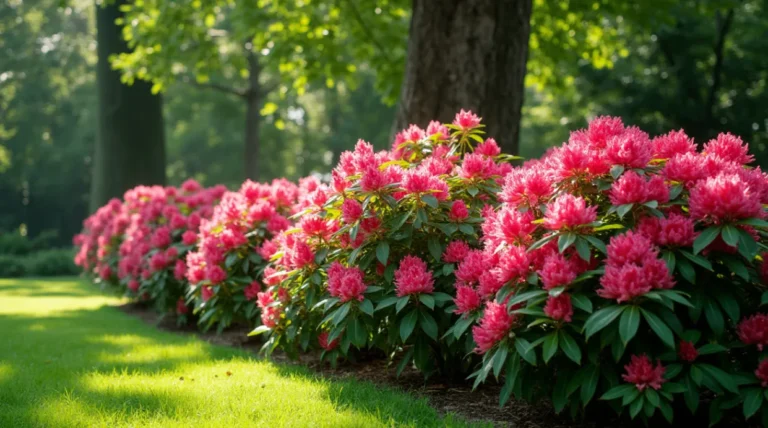Black Flowers and Their Meanings: A Dark and Beautiful Symbolism
Introduction
Black flowers are a rare and captivating phenomenon in the natural world, admired for their enigmatic beauty and symbolic depth. Unlike the bright and cheerful blooms often associated with gardens and bouquets, black flowers exude an air of mystery, elegance, and sophistication that sets them apart. Their dark allure has made them a favorite choice for those seeking something unique and meaningful in floral arrangements or garden design.
Despite being referred to as “black,” most of these flowers are not truly black. Instead, their petals are deep shades of purple, maroon, or red, which appear black under certain lighting conditions. This rarity only adds to their charm, making them a symbol of the extraordinary.
Black flowers have been used throughout history to convey complex emotions and ideas. In Victorian times, they were associated with farewells and mourning, while in modern contexts, they often represent rebirth, strength, and individuality. Their ability to embody such diverse meanings makes them a fascinating topic for exploration.
In this blog, we will delve into the world of black flowers, uncovering their meanings, types, and cultural significance. From the elegance of the Black Rose to the mystery of the Black Dahlia, we’ll explore why these dark blooms captivate so many hearts and minds. Whether you’re a gardener, a flower enthusiast, or simply intrigued by their symbolism, this guide will provide insights into why black flowers hold a timeless appeal.
What Makes Black Flowers Unique?
Black flowers stand out in the floral world for several reasons, not only due to their unusual appearance but also because of the deep symbolism and rarity associated with them. Unlike the more common bright or pastel-colored flowers, black flowers possess a unique elegance and mystery that make them both striking and captivating. Here’s a closer look at what makes black flowers so special:
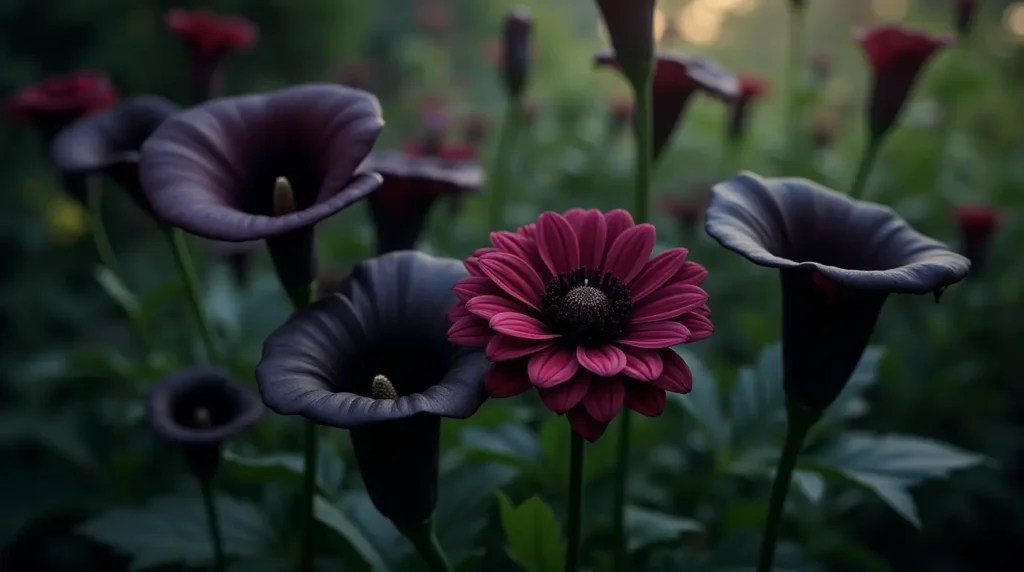
The Rarity of Natural Black Flowers and How They Are Perceived
True black flowers are incredibly rare in nature. While there are no flowers that are truly black, many plants display dark hues that, under certain lighting, appear black to the human eye. These flowers often have deep purple, burgundy, or dark maroon tones, but their color intensity can create the illusion of pure blackness. The rarity of these flowers adds to their allure, as they are not commonly found in the average garden or floral shop.
The perception of black flowers has evolved over time. In the past, they were often seen with an air of mystery or even fear, largely due to their association with death and mourning. However, modern interpretations have redefined their meaning, highlighting their elegance, resilience, and strength. Today, black flowers are often viewed as a symbol of uniqueness, sophistication, and power. This shift in perception has made them a popular choice for those seeking a distinctive addition to their garden or a dramatic accent in floral arrangements.
Symbolism of Black Flowers: Mystery, Elegance, and Strength
Black flowers are imbued with rich symbolism, making them more than just a beautiful addition to a bouquet or garden. Historically, they were often linked to darker concepts like death, mourning, and farewell. However, as society’s views on death and the afterlife evolved, so did the symbolic meanings of black flowers.
- Mystery: Black flowers are frequently associated with the unknown, the hidden, and the mysterious. They evoke a sense of intrigue, capturing the imagination and encouraging reflection on life’s deeper questions.
- Elegance: With their dark and dramatic hues, black flowers symbolize high-class elegance and sophistication. They’re often chosen for their ability to elevate the visual impact of any space, whether in gardens or as part of a chic floral arrangement.
- Strength and Resilience: Despite their association with somber themes, black flowers also symbolize strength and resilience. Their dark hues can represent overcoming adversity, standing firm in the face of challenges, or embracing new beginnings in the midst of change.
Whether it’s a Black Dahlia, Black Rose, or Black Calla Lily, each of these blooms carries its own specific meaning, but they all share a common thread of depth, mystery, and power.
The Science Behind Black Flower Pigmentation (Deep Purples and Reds)
The black coloration of flowers isn’t due to a true black pigment, as there are no plants with a naturally occurring black pigment. Instead, the appearance of black is created by the concentration of anthocyanins—pigments that give flowers their purple, red, and blue colors—combined with other compounds like tannins, which can darken the flower further.
For example, the Black Rose is often a very deep red or purple, but its petals absorb light in such a way that it appears black, especially under certain lighting conditions. Similarly, the Queen of Night Tulip is a deep, rich maroon that looks black in the evening light. The fact that these flowers appear black under certain conditions adds to their mystique and charm.
The cultivation of these flowers requires special care, as they often need ideal conditions, including proper soil, temperature, and light exposure, to reach their fullest color potential. This makes growing black flowers a rewarding challenge for passionate gardeners.
Types of Black Flowers You Should Know
Black flowers come in a variety of species, each offering its unique beauty and symbolism. While no flower is truly black, many exhibit deep, dark shades that create a striking appearance, particularly under certain lighting conditions. From classic favorites like the Black Rose to rare gems like the Black Calla Lily, each black flower brings a sense of mystery and elegance. Here are some of the most notable black flowers you should know:
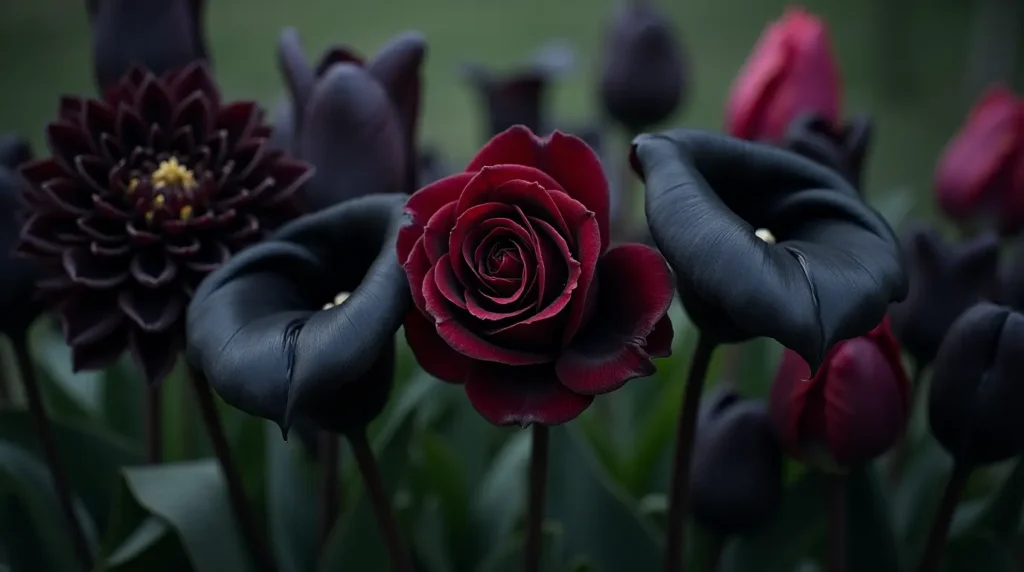
Black Rose – The Queen of Dark Flowers
The Black Rose is perhaps the most famous and iconic of all black flowers. Known for its deep, dark color, the Black Rose is a stunning symbol of both beauty and mystery. While it isn’t truly black, its deep crimson or purplish hues give it a black appearance, especially when viewed in low light.
- Symbolism: Traditionally, Black Roses symbolize death, farewell, and mourning. However, in modern interpretations, they can represent new beginnings, rebirth, or even the end of something to make way for something new.
- Varieties: There are several varieties of Black Roses, including the Black Baccara and Black Magic. These roses have been bred for their dark, velvety petals, making them ideal for Gothic-themed events, weddings, and bouquets that aim to convey a sense of drama and elegance.
- Usage: Black Roses are often used in symbolic gestures, such as marking the end of a relationship, mourning the loss of a loved one, or as a statement of individuality and unconventional beauty.
Black Dahlia – A Symbol of Strength and Elegance
The Black Dahlia is another popular dark flower that captivates with its rich, velvety petals and bold, dramatic look. It’s often associated with mystery and intrigue, and its lush, layered appearance makes it a favorite among florists and gardeners alike.
- Symbolism: The Black Dahlia represents strength, elegance, and resilience. It can also symbolize the beauty found in the unknown, making it a perfect choice for those looking to express their own strength in the face of adversity. In some cultures, it also represents change and transformation.
- Appearance: The Black Dahlia’s deep, dark purple tones can appear almost black, especially under the right lighting. It has a complex, multi-layered bloom with petals that curl inwards, giving it a rich, voluminous look.
- Usage: This flower is often used in bouquets for Gothic weddings, Halloween décor, or even in floral arrangements for celebratory occasions where strength and renewal are themes.
Black Tulip – The Elegant “Queen of Night”
The Black Tulip is one of the most elegant dark flowers, known for its smooth, sleek appearance and deep maroon or purple petals that can appear black. Its beauty is simple yet striking, making it a sophisticated addition to any garden or bouquet.
- Symbolism: The Black Tulip is often associated with love, strength, and passion. While it may symbolize the mystery of romantic love, it can also represent the desire for the unattainable, as it is considered rare and difficult to grow.
- Varieties: The most famous variety of Black Tulip is the Queen of Night, which has deep purple petals that appear almost black in the evening light.
- Usage: The Black Tulip is often used in romantic settings or to symbolize eternal love. It’s also popular in garden design and floral arrangements meant to create a dramatic or moody aesthetic.
Black Calla Lily – The Bold, Exotic Beauty
The Black Calla Lily is a sleek and elegant flower known for its dark, dramatic appearance. With its long, trumpet-shaped blooms and deep, velvety hue, it has become a favorite for weddings and other formal events.
- Symbolism: The Black Calla Lily represents sophistication, beauty, and strength. In some cultures, it also symbolizes rebirth, making it a perfect choice for occasions marking new beginnings, such as a fresh start or a new phase in life.
- Appearance: The Black Calla Lily has rich, dark purple or maroon petals that can appear black, especially when lit by soft or low light. Its elegant shape and minimalistic look make it a favorite in modern floral designs.
- Usage: These flowers are often used in wedding bouquets, formal floral arrangements, and as a striking centerpiece in a variety of events. The Black Calla Lily’s sleek form makes it a symbol of elegance and refined beauty.
Other Black Flowers Worth Noticing
There are several other less common but equally captivating black flowers that you might want to explore:
- Black Orchid: Known for its exotic, rare beauty, the Black Orchid (often a deep purple variety like the Vanda Orchid) is a symbol of strength, luxury, and rare beauty.
- Black Hollyhock: This flower features deep purple blooms with a dark center, and it’s associated with power, mystery, and spirituality.
- Black Pansy: A dark variant of the classic pansy, these flowers are compact, bold, and symbolize deep thought and contemplation.
The Symbolism of Black Flowers in Different Cultures
Black flowers carry a depth of meaning that transcends borders and cultures, making them powerful symbols in various societies around the world. Their dark, mysterious nature often leads to them being associated with complex emotions and ideas. From love and strength to death and rebirth, the symbolism of black flowers differs significantly depending on cultural context. Here’s a deeper dive into how black flowers are viewed and interpreted across different cultures:
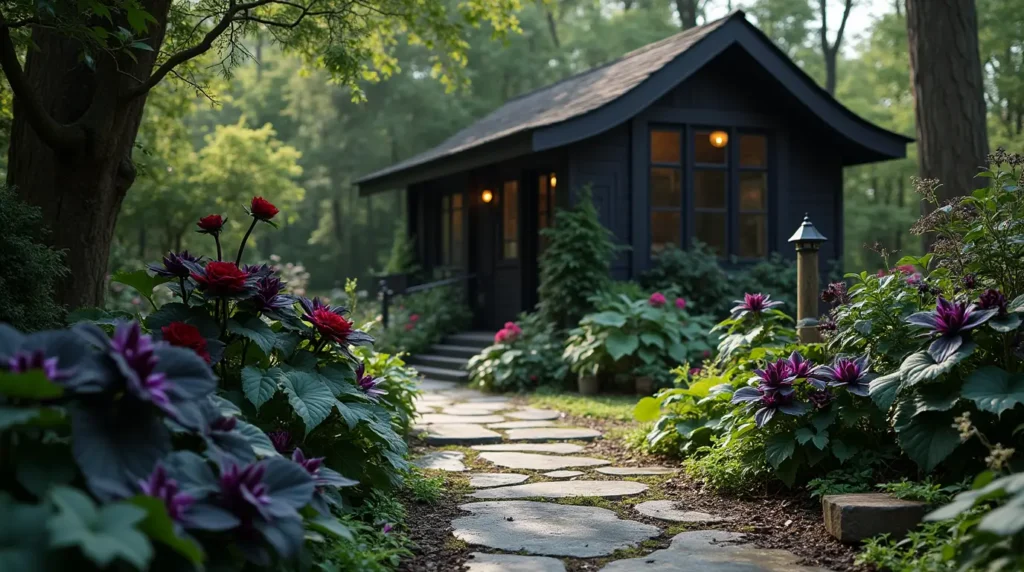
Black Flowers in Western Culture: Mourning and Rebirth
In Western culture, black flowers have historically been tied to mourning and death. This connection can be traced back to the Victorian era, when flowers were often used to convey messages of grief or sorrow, especially in funeral arrangements. Black flowers were commonly used to symbolize the end of a chapter in life, whether the death of a loved one or the closing of a significant life event.
- Mourning: In the context of death, black flowers are often seen as a tribute or symbol of respect. They carry the weight of loss, yet they also mark the beauty of life’s impermanence. The Black Rose, for example, has long been associated with the mourning of a deceased loved one, and it’s often used in funeral arrangements.
- Rebirth: Despite their association with death, black flowers are also symbols of rebirth and new beginnings in Western culture. This dual meaning makes them especially powerful. For example, the Black Dahlia, often seen as a symbol of resilience, represents the ability to overcome challenges and emerge stronger, embodying the spirit of transformation and renewal.
In contemporary times, black flowers are often used in Gothic-inspired settings, where they symbolize individuality, strength, and a break from societal norms. This modern interpretation embraces the mysterious beauty of these flowers, associating them with power, elegance, and a distinct identity.
Black Flowers in Eastern Culture: Spirituality and Strength
In Eastern cultures, black flowers are often imbued with spiritual meanings and are associated with concepts like enlightenment, strength, and the impermanence of life. While black flowers may still carry some connotations of mourning, they are more frequently seen as symbols of spiritual growth and transformation.
- Spiritual Enlightenment: In Buddhist culture, for example, black flowers may be seen as representations of the journey toward enlightenment. The Black Lotus (which is rare and symbolic in some traditions) is a powerful symbol of overcoming life’s obstacles and achieving spiritual purity. Its deep color represents the mysteries of the universe and the wisdom gained through hardship.
- Strength and Resilience: Many Eastern philosophies view black flowers as symbols of resilience and strength. Just as the darkness of night is a precursor to the dawn, black flowers represent the inner strength required to navigate life’s most difficult challenges. The Black Orchid, revered in some Asian cultures, embodies luxury and strength, but it also signifies the delicate balance of beauty and toughness that exists in nature and the human experience.
In countries like Japan, black flowers are sometimes used in the context of kintsugi, the Japanese art of repairing broken pottery with gold. This metaphor reflects how the flaws and imperfections (symbolized by black flowers) are an essential part of life’s beauty and worth, encouraging the acceptance of life’s imperfections.
Black Flowers in Mexican Culture: Day of the Dead and Ancestral Connections
In Mexican culture, black flowers play an important role in the Día de los Muertos (Day of the Dead) celebrations, a time when families gather to honor and remember their deceased loved ones. The Marigold (specifically the Cempasúchil variety) is one of the most prominent flowers associated with this celebration, but its deep orange and yellow petals are often juxtaposed with darker tones in altars and decorations.
- Connection to Ancestors: While marigolds are the primary flower of this celebration, black flowers are sometimes used to evoke a sense of the ancestors’ presence. Their dark hues symbolize the shadow of death, yet they also carry the meaning of remembrance and respect for the spirits of the deceased.
- Cycle of Life and Death: The use of black flowers in the context of Día de los Muertos is not only about mourning but also about celebrating the ongoing cycle of life and death. It reflects the Mexican belief that death is not the end but rather a part of a continuous, natural process. Black flowers, such as black roses, can be used to mark both the somber side of death and the vibrant connection to the spirit world.
In this culture, the symbolism of black flowers encourages reverence, continuity, and the beauty of remembering those who have passed.
Black Flowers in African Culture: Transformation and Strength
In African cultures, black flowers can have various meanings depending on the specific traditions and local beliefs. They are often symbols of transformation and strength and may also represent connections to the spiritual realm or ancestral wisdom.
- Transformation: In some African cultures, black flowers symbolize personal growth, resilience, and the power of transformation. Just as the dark earth gives rise to new life, black flowers are seen as a representation of rebirth and renewal.
- Spirituality and Ancestral Reverence: Similar to Mexican traditions, some African cultures use dark flowers in rituals to honor ancestors or invoke spiritual strength. The Black Orchid, for example, is sometimes associated with the mystical power of the divine and is believed to possess healing properties.
- Strength in Adversity: Just as the African continent is known for its resilience in the face of adversity, black flowers in African symbolism often embody endurance, beauty, and strength through hardship.
The symbolism of black flowers in African cultures is rich and multifaceted, reflecting the complexity of life and death, personal transformation, and the connection to the spiritual world.
Black Flowers in Western Popular Culture: Rebellion and Elegance
In modern Western pop culture, black flowers often carry meanings of rebellion, individuality, and elegance. They are a common feature in alternative subcultures such as Goth, where they symbolize defiance against societal norms and a celebration of the darker, more mysterious side of life.
- Rebellion and Defiance: Black flowers are often used to express nonconformity, defying traditional notions of beauty. They appeal to those who want to stand out and embrace their uniqueness, making them popular in alternative fashion and art.
- Elegance and High Fashion: At the same time, black flowers are also associated with elegance and sophistication. They are used in high-fashion floral arrangements and are sometimes seen in elegant wedding bouquets, adding a touch of drama and luxury to the occasion.
In contemporary culture, black flowers embody the essence of embracing one’s identity and celebrating the beauty of the unconventional.
How to Grow and Care for Black Flowers
Growing black flowers can be an exciting challenge for any gardener, as these dark blooms require specific care to thrive and maintain their stunning, deep hues. While no flower is truly black, many varieties have deep, rich colors that appear black under certain lighting. To achieve the best results, it’s essential to understand the unique needs of these flowers. Here’s an expanded guide on how to grow and care for black flowers:
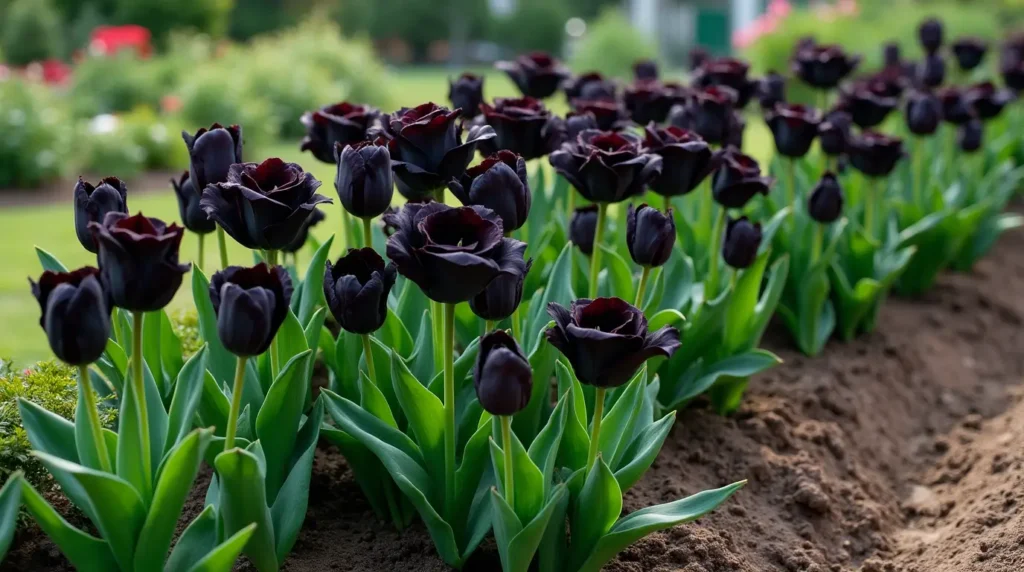
Choosing the Right Black Flower for Your Garden
Before you can successfully grow black flowers, you need to select the right types for your climate and growing conditions. Not all black flowers are suited for every environment, so it’s essential to match the plant to your garden’s needs. Some black flowers, like Black Roses and Black Dahlias, thrive in warmer climates, while others, like Black Tulips or Black Calla Lilies, may require more specific growing conditions.
- Black Roses: Prefer full sun and well-drained soil, and they require consistent watering, especially in dry climates. Choose varieties like Black Baccara or Black Magic for a dramatic touch to your garden.
- Black Tulips: These prefer cool climates with well-drained, sandy soil. They should be planted in the fall for a spring bloom.
- Black Dahlia: These thrive in rich, well-drained soil with plenty of sunlight. They are often grown in warmer climates and can grow quite tall, requiring staking to keep the blooms upright.
- Black Calla Lilies: These flowers prefer well-drained, slightly acidic soil and thrive in sunny to partially shaded areas. They are perfect for garden beds or pots.
Preparing the Soil for Black Flowers
Soil preparation is crucial to growing healthy black flowers, as the right soil ensures that the plants have the nutrients and drainage they need to flourish. While different black flowers may have slightly different soil preferences, there are some general tips to follow:
- Drainage: Black flowers, particularly those like Black Roses and Black Calla Lilies, require well-draining soil. If the soil retains too much water, the roots can become waterlogged, leading to root rot. You can improve soil drainage by adding sand or organic matter to the soil.
- Soil pH: Different flowers have specific pH preferences. For example, Black Calla Lilies prefer slightly acidic soil (around pH 6.0 to 6.5), while Black Dahlias do well in slightly alkaline to neutral soil (around pH 6.5 to 7.0). Be sure to test your soil’s pH and adjust accordingly using lime (to raise pH) or sulfur (to lower pH).
- Organic Matter: Adding compost or well-rotted manure can improve soil fertility and texture, ensuring the plants receive the nutrients they need. Organic matter also helps retain moisture, preventing the soil from drying out too quickly.
Planting Black Flowers
The planting process for black flowers is similar to most other flowers, but there are a few specific considerations to keep in mind to ensure successful growth. Here are some general planting tips:
- Planting Depth: Follow the planting depth guidelines for each variety of black flowers. For example, Black Tulips should be planted about 6 inches deep, while Black Dahlias should be planted around 4 to 6 inches deep, depending on the size of the tuber.
- Spacing: Proper spacing is essential for allowing black flowers to grow and develop fully. Black Dahlias can get quite large, so ensure they are spaced about 18 inches apart to give them room to spread. Black Roses, depending on the variety, may need 2 to 3 feet of space between plants to allow for air circulation and to prevent disease.
- Sunlight: Most black flowers, like Black Roses and Black Dahlias, prefer full sun to thrive. Ensure they are planted in a spot that gets 6 to 8 hours of direct sunlight daily.
Black Calla Lilies, on the other hand, can tolerate partial shade, so consider planting them in spots with morning sun and afternoon shade.
Watering Black Flowers
Proper watering is essential for maintaining healthy black flowers. Over-watering or under-watering can lead to poor growth, reduced flowering, or even plant death. Here’s how to care for the watering needs of black flowers:
- Consistent Moisture: Black flowers, like Black Roses, require consistent moisture, especially during hot weather. However, it’s crucial not to let the soil become soggy. Ensure proper drainage to prevent root rot.
- Watering Frequency: The frequency of watering will depend on the specific flower variety and your climate. In general, black flowers should be watered deeply once a week, ensuring that the soil is moistened to the root level. During especially hot or dry periods, you might need to water more often.
- Morning Watering: It’s best to water black flowers in the morning when temperatures are cooler. This reduces the chance of fungal diseases, as watering in the evening can leave the plants wet overnight.
Fertilizing Black Flowers
Like any other flowers, black flowers benefit from regular feeding to encourage healthy growth and abundant blooms. Fertilization can help ensure that your plants have the nutrients they need for vibrant color and strong stems.
- Balanced Fertilizer: Use a balanced fertilizer (with equal parts nitrogen, phosphorus, and potassium) during the growing season to provide essential nutrients. For Black Roses and Black Dahlias, a slow-release fertilizer applied in early spring can help promote healthy growth and long-lasting blooms.
- Organic Options: Organic fertilizers like compost, fish emulsion, or well-rotted manure are great for feeding black flowers without overwhelming them with chemicals. Organic options also help improve the soil structure over time.
- Avoid Over-Fertilizing: Be careful not to over-fertilize, especially with nitrogen-rich fertilizers, as this can lead to lush foliage growth at the expense of blooms. A good rule of thumb is to fertilize every 4 to 6 weeks during the growing season, following the instructions on your specific fertilizer.
Pruning and Deadheading Black Flowers
Pruning and deadheading are important tasks to keep black flowers looking their best and to encourage continuous blooming. Here’s how to properly care for your plants:
- Pruning: Prune black flowers, such as Black Dahlias and Black Roses, to remove dead or damaged stems and encourage new growth. For roses, prune back spent blooms in the early spring to promote fresh growth and maintain the plant’s shape.
- Deadheading: For flowers like Black Dahlias, deadheading (removing spent flowers) can extend the blooming season and encourage the plant to produce more flowers. Be sure to remove the spent blooms at their base to avoid any chance of disease spreading.
Pest and Disease Control
Like all flowers, black flowers are susceptible to pests and diseases. By providing proper care and attention, you can prevent and address these issues.
- Common Pests: Watch for aphids, spider mites, and snails, which can damage black flowers. Combat infestations using insecticidal soap or neem oil.
- Diseases: Black Roses are particularly prone to fungal diseases like black spots and powdery mildew. To prevent this, ensure proper air circulation, and water at the base of the plant, and remove any infected leaves immediately.
By staying on top of pest management and disease prevention, you can ensure your black flowers remain healthy and vibrant throughout the growing season.
Black Flowers in Art, Literature, and Special Occasions
Black flowers have long held a deep connection with the realms of art, literature, and special occasions, often being used to evoke powerful emotions and symbolism. These flowers transcend their physical beauty, becoming potent symbols of mystery, passion, death, and even the extraordinary. Whether adorning a painting, playing a role in a novel, or enhancing the atmosphere of a special event, black flowers have always held a place of significance in these cultural and creative expressions.
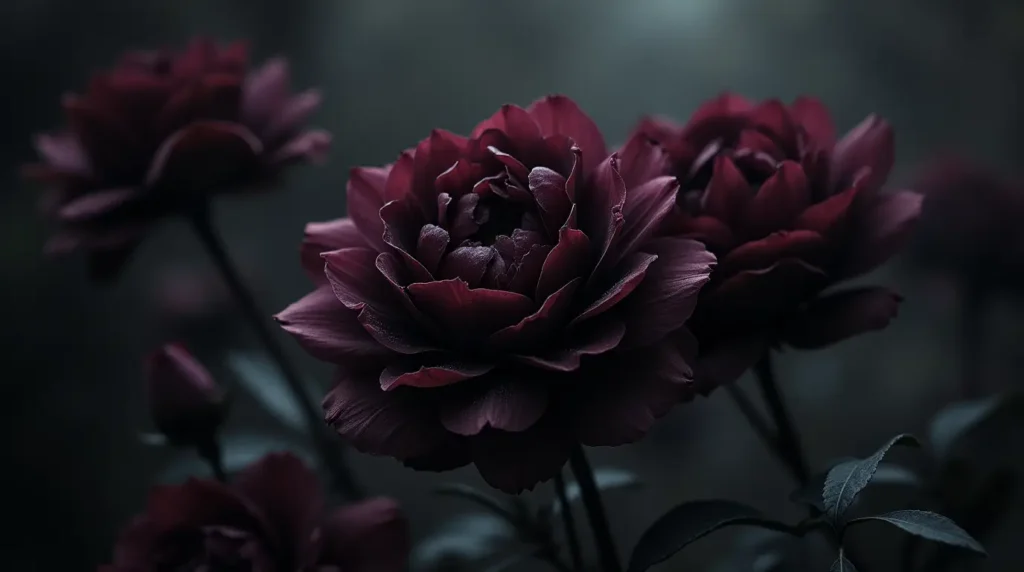
Black Flowers in Art
Throughout history, black flowers have been depicted in various art forms, often representing themes of elegance, mystery, or melancholy. Artists use black flowers to convey emotions that are complex and multifaceted, invoking responses from the viewers based on personal experiences or societal associations.
- Symbolism in Paintings: Black flowers in art often carry a dual symbolism. They can represent the beauty found in darkness, as in works where flowers are used to create an ethereal or haunting atmosphere. For example, Black Tulips in Dutch still-life paintings might symbolize the passage of time, the brevity of life, and the inevitable decay that follows beauty. The contrast of dark, bold flowers against a soft background creates a striking visual impact, evoking feelings of both awe and somber reflection.
- Modern Interpretations: In contemporary art, black flowers are used to explore themes like transformation, power, and even the supernatural. Artists might incorporate black flowers to challenge traditional perceptions of beauty, using them as symbols of defiance, independence, or emotional complexity. The boldness of the black petals suggests a break from the conventional, often indicating a theme of empowerment or resistance.
- Photography: Black flowers are also a favorite subject in photography, particularly in capturing contrast and exploring texture. Photographers often use these flowers to play with light and shadow, emphasizing the uniqueness and allure of the dark petals. These images may evoke a sense of mystery or melancholy, often exploring the fine line between beauty and death.
Black Flowers in Literature
In literature, black flowers often serve as potent symbols, representing various themes such as death, mourning, and the darker aspects of human nature. Writers and poets frequently use black flowers to imbue their works with a sense of foreboding, elegance, or emotional depth.
- Symbolism of Death and Mourning: In classical literature, black flowers, especially Black Roses or Black Lilies, are used as symbols of death, often associated with funerals, grief, or the end of a life cycle. Writers may describe them in vivid detail to evoke a sense of loss or to represent the passage from life to death. In works like Shakespeare’s Hamlet, flowers such as these may symbolize the fleeting nature of existence, emphasizing themes of transience and mortality.
- The Dark Side of Beauty: In more modern literary works, black flowers may be used to highlight the tension between beauty and tragedy. Their dark color, contrasting with vibrant blooms, often symbolizes the coexistence of joy and sorrow or the hidden beauty within suffering. For instance, a character might gift someone black flowers to convey a complex emotion—one that is not simply sorrowful but layered with longing, love, or even regret.
- Poetry and Symbolism: Poets also use black flowers to convey deep and often sorrowful emotions. They might describe the flowers as being “blackened” by pain, longing, or loss, serving as metaphors for the heartache or grief that characters experience. In works by poets like Emily Dickinson or Edgar Allan Poe, black flowers can represent the mysterious unknown, love lost, or the eternal struggle with one’s darker side.
Black Flowers in Special Occasions
While black flowers may not be the traditional choice for every celebration, they hold a special place in certain events and occasions, where their meaning resonates with the themes of the day. These flowers are often used to create an atmosphere of elegance, and mystery, or to mark significant life moments.
- Funerals and Memorials: One of the most common occasions where black flowers are used is at funerals or memorial services. Their deep, rich color symbolizes mourning, loss, and remembrance. Flowers such as Black Calla Lilies, Black Roses, or Black Dahlias are sometimes chosen for funeral arrangements or as wreaths to honor the deceased. These flowers are seen as a way of acknowledging the sorrow of loss while also celebrating the life that was lived. They can serve as a poignant reminder of the inevitability of death and the beauty that remains in memory.
- Weddings and Romantic Occasions: Black flowers are increasingly being used in weddings, especially in alternative or gothic-themed ceremonies. In these settings, black flowers can represent the mysterious or unconventional nature of the couple’s love. Black Roses, for example, are often used in bridal bouquets or centerpieces to add a unique touch of drama and elegance. They symbolize eternal love, passion, and the unity of two souls, transcending the more traditional meanings of flowers in weddings.
- Gothic and Alternative Celebrations: In gothic or alternative subcultures, black flowers are frequently used in ceremonies and celebrations, including birthday parties, anniversaries, or themed events. These flowers help set the tone for these gatherings, evoking a sense of mystery, elegance, or rebellion. Black Orchids or Black Tulips are popular choices in these settings, often used in decor to make a bold statement about individualism or a non-conformist attitude. Their presence in these events symbolizes beauty found in the unconventional and a break from societal norms.
- Halloween and Themed Parties: Black flowers also find a place in Halloween decorations or themed parties. In these contexts, they can be used to evoke a spooky or eerie atmosphere, adding a touch of glamour to the event. Dark, velvety blooms like Black Dahlias or Black Roses make perfect additions to haunted house decor or as part of a mysterious table centerpiece.
Black Flowers in Symbolism and Personal Significance
On special occasions, black flowers may also carry personal significance, depending on the context or the individual’s relationship with the flower. Some people choose them for their own symbolism, such as representing resilience, inner strength, or transformation.
- Personal Growth: Some individuals might select black flowers as a symbol of their personal journey, using the flowers to represent overcoming hardship or embracing change. Black flowers can symbolize the strength to grow from darkness or adversity, making them meaningful choices for significant life milestones such as anniversaries or personal celebrations.
- Mystery and the Unseen: For others, black flowers may symbolize the allure of the unknown. Their dark petals, often seen as mysterious, can evoke curiosity and a sense of wonder. Using black flowers on occasions like birthday celebrations or intimate gatherings can represent a desire to explore the depths of life’s mysteries, whether that be in relationships, self-discovery, or adventure.
Conclusion
Black flowers possess a unique beauty that combines mystery, elegance, and symbolism. Their deep, dark tones stand out in a world dominated by vibrant colors, making them captivating and intriguing. These flowers symbolize various themes, from death and mourning to transformation and strength, offering a powerful reflection of life’s complexities.
A Symbol of Mystery and Elegance
Black flowers stand out for their sophisticated and mysterious beauty, appealing to those who appreciate the unconventional and the deeper aspects of life.
Rich Cultural Symbolism
In different cultures, black flowers represent both endings and new beginnings, resilience, and the complexity of human emotions. They have a strong presence in art and literature, symbolizing the balance between sorrow and strength.
Beauty in Darkness
Despite their dark appearance, black flowers offer a rare, dramatic beauty that adds depth to gardens and floral arrangements, pushing the boundaries of conventional aesthetics.
A Personal Reflection
Choosing black flowers can be a deeply personal statement, symbolizing growth, strength, and a love for life’s complexities. They invite us to embrace both the light and the shadows in our experiences.
The Future of Black Flowers
As interest in unique flowers grows, black flowers will continue to symbolize mystery and elegance, remaining a powerful tool for artistic expression and personal meaning. Their timeless appeal ensures they will always captivate and inspire.
In conclusion, black flowers are not just beautiful, but profound symbols of life’s complexity, inviting us to appreciate the beauty found in darkness.

